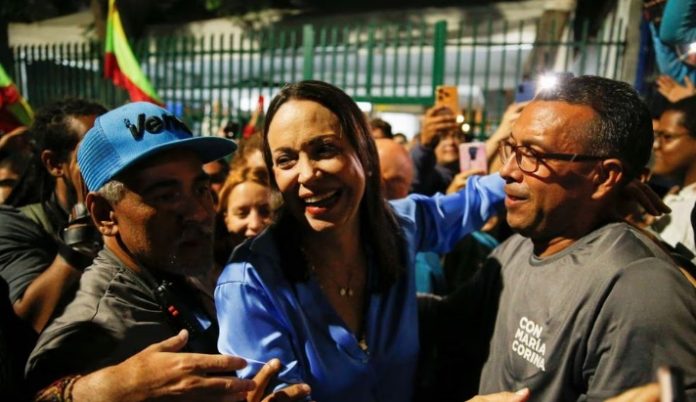Former lawmaker Maria Corina Machado won Venezuela’s opposition presidential primary on Monday by a wide margin, according to NBC News.
Machado quickly claimed her victory as the voters’ choice to lead a campaign that will end Nicolás Maduro ‘s decade-long crisis rule.
The independent National Primaries Commission did not announce the results until after the polls closed on Sunday. Organisers said that in the first 601,110 ballots counted, about 93% favoured Machado, who went to the polls with a large lead. The remaining votes were split among nine other candidates. The total number of people who voted is not yet known. All registered voters in Venezuela were allowed to participate in the primary, as well as tens of thousands living in several other countries. Machado told supporters gathered outside her campaign headquarters in the capital, Caracas:
“Today, very powerful forces have been unleashed. Today, we have shown ourselves what we are capable of doing in the face of all the obstacles, in the face of all the abuses.”
While the administration has agreed in principle to let the opposition choose its candidate for the 2024 presidential election, it has also already barred Machado from running. In the past, Maduro’s government has already broken the law, retaliated against opponents and violated agreements at will. Even before voting began, hundreds of people crowded outside voting centres across Caracas despite the downpour.
Caracas resident Stephanie Aguilar, 34, cried as she waited to vote. She sees the primaries as the only “salvation” for her country, her daughter and son, and the millions of Venezuelans who have chosen to emigrate because of the country’s economic and political turmoil.
“We want a better country, a free country, for my children … who have grown up in this government,” Aguilar, a housewife, said as she wiped tears from her face. “They ask, ‘Mom, can we go out to eat?’ No, there is no money. ‘Mom, can we do this thing?’ No, there is no money. It is unfortunate that a society grows up under those conditions.”
Normally, it is possible to vote in public schools in Venezuela, but the independent commission overseeing the primaries decided to use homes, churches, public schools and other facilities after electoral authorities failed to respond to requests for assistance in a timely manner.
David Smilde, an expert on Venezuelan politics at Tulane University, believes the primary became a “significant achievement” for several reasons, including to get political leaders and parties in the opposition to “reach out and talk to the people.” He said:
“And it has generated considerable enthusiasm and mobilization in a population that has been skeptical of the opposition leadership of late.”
Machado, an advocate of free market economic policies, has been a vocal critic of Venezuela’s ruling United Socialist Party. For years, she has held a somewhat modest position, but she began to dominate the primary election campaign, attracting the same voters she had consistently urged to boycott previous elections.
Presidential elections will be scheduled for the second half of 2024. Maduro expects to remain in power until 2030, exceeding the reign of Hugo Chavez, his mentor, who implemented his self-proclaimed socialist policies.
Maduro’s associates rejected the results of the primaries. Nevertheless, both the government and its opponents used the contest to extract concessions from each other as part of a negotiation process aimed at overcoming the country’s complex socioeconomic and political crisis.
Last week, Maduro and the US-backed opposition faction agreed to work together on the basic terms of the presidential contest. As a result, the government released six political prisoners and the US administration lifted key economic sanctions. As part of the agreement, the Maduro administration and the opposition must “recognise and respect the right of every political entity to freely choose” a presidential candidate.
If organisers declare Machado the winner of the primaries, Maduro’s attention will shift to whether the government will lift the ban on her running for public office. In June, the government issued an administrative decision that barred Machado from running, accusing her of fraud and tax law violations, as well as seeking to enforce US economic sanctions imposed on Venezuela over the past decade. Machado has said she could pressure the electoral authorities to let her register, while others have argued a substitute will be necessary.
Machado, who describes herself as a centrist, wants to revive Venezuela’s battered economy through market-friendly policies and widespread privatization, including of the key oil sector. She would also seek to roll Venezuela’s massive debt pile into a single bond.
